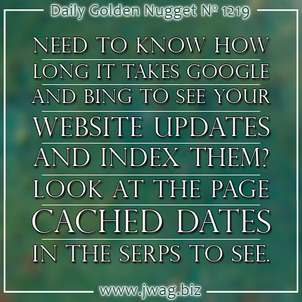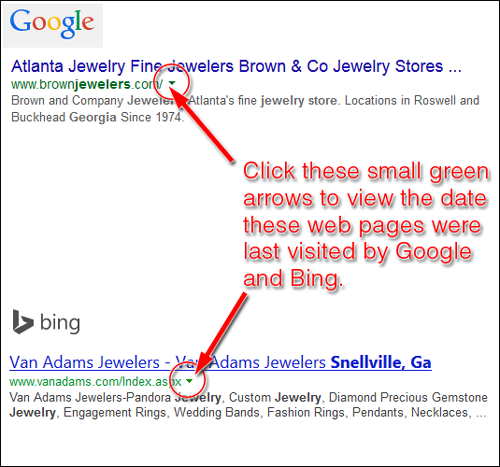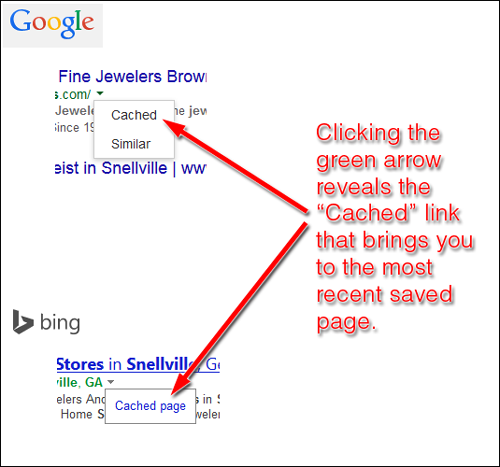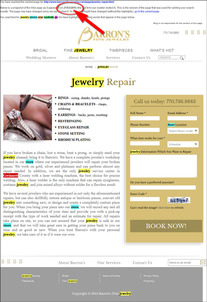
In this edition of #ThrowbackThursday, I'm jumping back to Daily Golden Nugget number 218 from March 25, 2011. Back then, Google was generating SERP instant preview images for websites, a feature that was then dropped in April 2013, but it I want to cover a different topic from that Nugget that I never wrote about in detail...
Google Cache and Bing Cache.
Both Google and Bing record the last time they downloaded your web pages and they make that date available in the search results, if you know where to look.
Take a look at this screen grab:

The little green dropdown arrows I've pointed out in that above image, have been in there for a very long time.
Clicking the green arrow reveals the "Cached" link that you see in this screen grab:

Clicking that cached link then brings you to the most recent saved page that Google and Bing saw during their last visit.
Bing Cached Paes
On Bing, this is what a cached page looks like when you click the link:

(click to view larger)
This particular page was last spidered by Bing 4 days before I wrote this Nugget. Bing is also including my search phrase at the top of the cached page with color coded cross referencing to show me why this particular page appeared in the SERP.
My search phrase was "jewelry stores near snellville ga." Because the word "jewelry" is highlighted in yellow, I can quickly see that it was matched 13 times on that page. The word "store" was matched 4 times.
In today's SEO world we don't count keyword density on a page as a measure of how well we rank, but years ago, we were able to use this caching feature to actually help us count them. It's pretty misleading that Bing still includes this keyword information here.
Google Cached Pages
On Google, this is what a cached page looks like when you click the link:

(click to enlarge)
According to this snapshot, Google last visited this website 8 days prior to when I wrote this Nugget.
You'll notice that Google does not include any keyword information at the top of this cached page. They used to include it years ago, but again, you should not be counting keywords as a method of ranking. They removed it so as not to mislead you into thinking you should count them.
What Good is the Cached Date?
Viewing the cached date for your own website will help you find out how often search engines visit your site, but it also helps you understand how long it takes Google and Bing to update their index after you've made changes.
Here are two ways you can use the cached information:
1. Add a new page to your site and check Google and Bing daily until it appears. Let's say you add the page on Monday, but it does not appear in the SERP until Saturday. If the cached date says Wednesday, then you know it took 2 days for the search engine to find the new page and another 3 days for it to appear in the results.
2. Make a change to one of the pages on your site then check the SERP every day to see when the new change appears. What does the cached date say? There will always be some lag time between the your website update, the time the search engines find that update, and the time that update appears in the SERP.
In a nutshell, there's a propagation delay between the time you post something on your site and the time it appears in SERPs. That delay will be shorter for more popular sites and those who add new content regularly; and longer for sites that update less frequently.
Studying the cached dates for your own site will help you understand how this propagation delay works.








